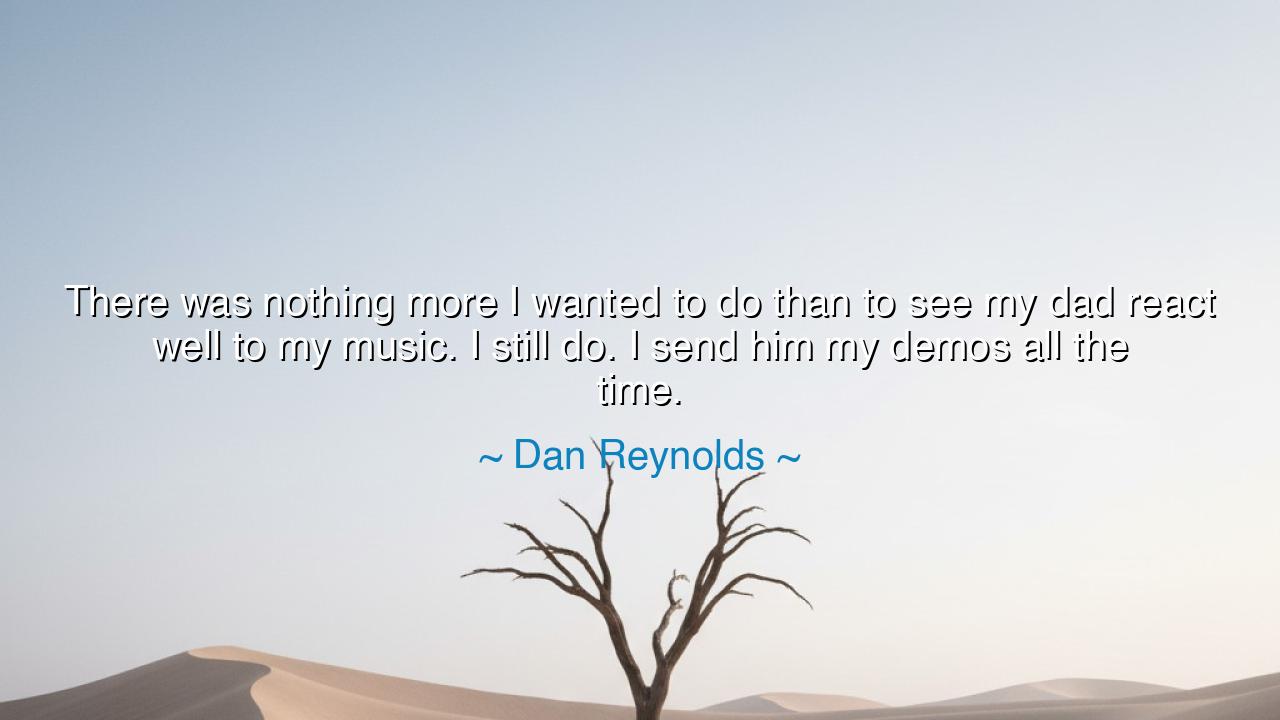
There was nothing more I wanted to do than to see my dad react
There was nothing more I wanted to do than to see my dad react well to my music. I still do. I send him my demos all the time.






The words of Dan Reynolds—“There was nothing more I wanted to do than to see my dad react well to my music. I still do. I send him my demos all the time.”—speak to one of the most ancient and tender desires of the human heart: the longing for a father’s approval. Beneath their simplicity lies a truth as old as time—that no matter how far a person journeys, how great their achievements, or how high they rise, the yearning to be seen, understood, and loved by one’s parent remains an unquenchable flame. In this confession, Reynolds—musician, son, and seeker—reveals not the ambition of an artist, but the soul of a child still reaching toward the light of his father’s eyes.
At its heart, this quote tells of connection between generations, the sacred bridge between the old and the young. The son, who creates from passion and vulnerability, sends forth his work as an offering to the man who first shaped his world. It is as though he is saying, “See me, Father. See what I have made. See yourself reflected in me.” In this act, there is not pride but reverence—a deep wish to honor the roots from which he grew. The father’s reaction becomes not just validation, but a symbol of acceptance, love, and belonging. For in every child, no matter how accomplished or aged, lives a part that longs to make the parent proud.
Through the centuries, this longing has driven countless souls to greatness. Alexander the Great, when he conquered vast lands, carried within him not only ambition but the echo of his father’s expectations. King Philip of Macedon had dreamed of empire; Alexander fulfilled it and surpassed it, yet even then sought his father’s acknowledgment in every triumph. This is the paradox of the heart: we build kingdoms not merely to rule them, but to show those who came before us what they have wrought. The same impulse that stirred emperors also moves the artist who sends a song to his father, hoping for a smile that says, “You have done well.”
In Reynolds’s words, there is also the humility of continued seeking. Though he has achieved global fame and recognition, he still sends his father his demos—as if the applause of the world cannot compare to the quiet nod of approval from home. It is a reminder that no matter how far we travel, the soul always circles back to its origin. To share one’s work with a parent is to share one’s essence. It is not about praise, but about communion—the unspoken wish that our deepest self might be recognized by the one who helped shape it.
There is, too, a deeper layer of inheritance and identity within this confession. The music Reynolds creates is his own, yet it is born from the life his father gave him—the lessons, the values, the emotions. When a child creates, they echo the legacy of those who came before. Just as the flame passes from torch to torch, so does inspiration pass from parent to child. To seek a father’s reaction, then, is not weakness—it is a dialogue between past and present, between tradition and creation. It is the eternal cycle of life, in which the child’s art becomes the father’s fulfillment, and the father’s love becomes the child’s strength.
But there is also a quiet melancholy here—a recognition that the approval we seek may never be fully attained, that the parent’s understanding may not always meet the depth of the child’s creation. Yet even this longing, unfulfilled, becomes sacred. It keeps the heart humble. It reminds the artist that art is born not only of joy, but of yearning—the yearning to be known, to be loved, to be understood. And so, like Reynolds, we continue to send our “demos”—our work, our love, our efforts—into the world, hoping that somewhere, someone we care for will hear the music and say, “I am proud of you.”
Let this, then, be the teaching passed down to future generations: do not disdain your desire for approval; transform it into devotion. Create not for applause, but for love. Let your work be an offering—to your parents, your ancestors, to those whose hands shaped your path. And when you find yourself seeking someone’s understanding, remember that this desire is not weakness, but proof of your humanity. For every song written, every dream pursued, every act of creation is, in the end, a reaching out—a hope that those we love might see our light and smile. And that, perhaps, is the most beautiful yearning of all.






AAdministratorAdministrator
Welcome, honored guests. Please leave a comment, we will respond soon